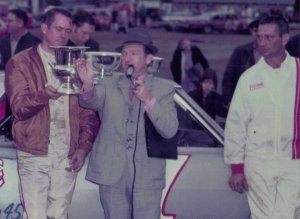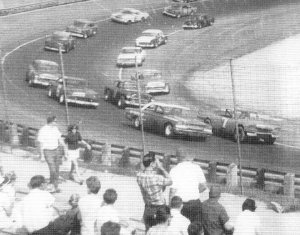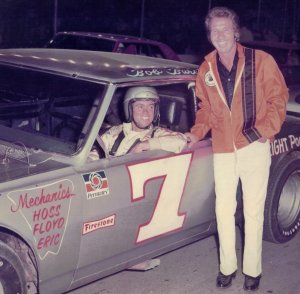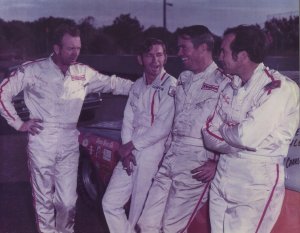Plymouths and Chevys

Once NASCAR ended the “Modified Special” division, Burcham had to build a completely different kind of car.
“This time I had to change directions,” he said. “Independent front suspension with complete body and fenders. All the tires had to be the same size. We had been running the small tire on the left front so it was altogether different. The first late model I built was a 1958 Plymouth in 1964. After we wore that one out we built a 1959 Plymouth. We had a 426-wedge head engine in it. It cost so much to run that car.”
“When we ran the Flameless 300 (at Nashville), I led for 299 laps, blew the engine and wound up third with Bobby Allison winning. Coming off the fourth turn, the crank broke and I coasted the last lap. I had a half a straightaway on Bobby. Another time, I remember one night I blew an engine at Macon and coasted into the pits with water running out the exhaust pipes. Jack Ingram just stood there and laughed. It made me so mad,” Bob said, finally laughing himself. “I had never had a serious wreck in the Plymouth, but it just cost so much to race. After that we switched to Chevys. I ran Nashville for several years when we got started running late models, then we started running Macon (Middle Georgia Raceway).”

Also in the early to mid sixties, Bob drove his 1958 and 1959 Plymouths in the Limited Sportsman series. At Byron's Middle Georgia Raceway in 1966, Burcham won four of six in a row, with Jack Ingram winning the other two. Here Burcham is on the pole (beside Dick Hutcherson) at Augusta International Speedway in 1967.
“I had been running the Plymouth at Nashville when this fellow offered me a 1957 Chevy for $1,300 he had been letting Jimmy Riggs drive,” Burcham said. “It was a good deal, so we took it home. I can’t remember if we actually ran the car. We took a ’55 Chevy and used what we could off that ’57 and made our own car. We ran that car at Nashville and Birmingham and other NASCAR races. We even went back to Mobile and Pensacola. I won a race or two at Mobile, but I don’t know why we went back to Pensacola. I would tear a car up every time we went down there. One of my worst wrecks was in Bob Wright’s built 1935 Chevy at Five Flags Speedway in Pensacola back in 1963. I went end-over-end about 15 times at a race called the Fiesta 200 (later called the Snowball Derby). I wasn’t hurt other than some pulled muscles and scratches, but the car was destroyed.”
“My favorite tracks were Macon (Middle Georgia Raceway in Byron) and Smoky Mountain (Maryville, TN) when it was asphalt. I liked them both. You learned a lot on dirt right quick. It took a long time to learn how to control a skid and spinout and stuff. Red Farmer is the only man I ever saw who could make time on asphalt by spinning his wheels. Asphalt is easier. We ran strictly asphalt with late models.”

Burcham at Nashville with his friend, singer/racer Marty Robbins. Marty raced from 1965 until a month before he died in 1982.
“When we built our Chevelle around 1968, we got the rear end from Franklin Engineering in Florida and the rest out of a junkyard. We were running the car at Middle Georgia Raceway. We bought a new 327 short block for about $300 – put some clearance in it and started winning some races. We didn’t even balance it – just some good clearance and a cam and that was it. You could do some machine work and put a cam in them and that was about all we were allowed to do. No magnetos allowed. You had to run a stock cubic inch engine and a four-barrel, but there were no weight limitations – we gutted the car pretty good. When they went to a weight limit, I had to add 400 pounds to make it legal for the cubic inch we had. We just kinda piled some chunks of iron in the trunk. The rear spring collapsed once and I had to come out of the race. After that we came home and drilled holes in the roll bars and poured lead into the bottom of them.”

Red Farmer, Donnie Allison, Bob Burcham and Freddy Fryar have a friendly chat before a race at Montgomery International Spedway around 1970.
“I have won races on the last lap, too,” Burcham said. “At Jefco (now Gresham Motorsports Park), GA, one time, LeeRoy Yarbrough was in first and I was about a straightaway behind him when he blew his engine and I won by four or five car lengths. I did win a race at Baton Rouge when I was five laps (ahead) on the field. That was a 300-lap race and there were seven cars there that were flying. Bobby Allison, Donnie Allison, Red Farmer and, of course, Freddy Fryar – all of them were there. Freddy started on the pole and I was outside. At 250 laps, everybody had fallen out but Freddy and me. He was still leading and I was running second. He fell out with a broken radiator. That was when there were a lot of wrecks with so many others just falling out of the race.”
“I crashed at Nashville on Saturday and we worked all night to make it to Birmingham for a Sunday afternoon event. We got there in time for it to be rained out. We ran Smoky Mountain, Nashville, Montgomery and Birmingham – all NASCAR tracks – in the early ‘70s when the Georgia NASCAR circuit collapsed. We stayed on the road while we ran in Alabama. And if there was some work to be done on the car after a night of racing on that tough circuit, we would use some space in one of the local guy’s garage.”
